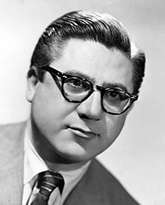Irving Szathmary
Irving Szathmary, born Isadore Szathmary (October 30, 1907 – October 29, 1983) in Quincy, Massachusetts, and died in Valletta, Malta, on the eve of his 76th birthday, was a Hungarian-American musical composer and arranger most known for scoring the Get Smart television series. His wife was Irene Szathmary (born 1905) and his daughter was Elizabeth Szathmary (born 1938).[1]

Biography
One of six children, his youngest brother was comedian Bill Dana. Szathmary was a child prodigy pianist from the age of five.[2] Before graduating from Quincy High School in 1925, he adopted the name "Irving".[3] At the same time he formed a band with his brother Albert, the Szathmary Symphonic Syncopaters. Al Szathmary (26 April 1906 – 9 June 1975) later had a career as an actor and was a stand-in on Get Smart.[4] Another brother was Arthur (1916–2013) who was a member of the Philosophy Department at Princeton University 1947–1986.[5] Another brother, Sidney played violin in the Indianapolis Symphony Orchestra from 1945 to 1978 [6] The family had one sister, Fannie (23 July 1919 – 8 January 2010) who was an associate law librarian at the University of Southern California.[7]
Musical career
Szathmary began arranging for a variety of orchestras, including Benny Goodman in 1934, Emery Deutsch in 1935, Artie Shaw in 1936, and Andre Kostelanetz from 1936 to 1977 and from 1937, Paul Whiteman[8] until joining Jack Teagarden in 1940.
During World War II he transcribed many orchestral pieces on V-Disc for American servicemen and began recording arrangements for featured singers such as Frank Sinatra and Mary Martin. He composed a hit song, "Leave It To Love", in 1948.
He composed the music for a 1950 United Nations radio program about drug addiction called The Shooting Gallery that was narrated by Gary Cooper. Later in the 1950s he arranged music for Your Hit Parade and The Ed Sullivan Show.
When his comedian brother Bill arrived in New York in the early 1950s, performing stand-up under his birth name Szathmary, Irving admonished him with "Don't you know that I have a reputation in music?" that led Bill to adopt the surname "Dana" after their mother "Dene".[3] Irving sometimes used the names Szath-Myri and Irving Zathmary.
In 1959 Irving headed Citation Records.[9]
Television work
It was Bill Dana who introduced his brother to comedy writer and television producer Leonard Stern to compose the music for Stern's television show I'm Dickens, He's Fenster. Stern loved the silly sound of the old Laurel and Hardy theme and suggested something like it. Szathmary returned a day or two later with a theme. "I sensed there was something unique about it," says Stern, but Szathmary decided to prepare a more elaborate demonstration. Another day or two later, he returned with a bass player, drummer, saxophonist and even a vocalist with Irving playing piano. "Finally I started to hear the distinctive melody," says Stern. "So I hired him, and he made the arrangements and conducted the orchestra as well." [10]
Szathmary also composed the music for an unsuccessful Stern 1963 television pilot Duncan Be Careful and composed the background music for his brother's The Bill Dana Show.
His collaboration with Stern led him to compose the theme and score all the episodes of Get Smart. He retired to Malta when the series left the air.
Notes
- http://www.ancestry.com/1940-census/usa/New-York/Irving-Szathmary_d2sch
- https://www.imdb.com/name/nm0843805/bio?ref_=nm_ov_bio_sm#trivia
- Burlingame, Jon Get Szathmary! Irving Szathmary, Get Smart's Forgotten Composer Film Music Society July 21, 2008
- https://www.imdb.com/name/nm0843803/
- https://philosophy.princeton.edu/node/1332
- p.34 Akins, Thomas N. Behind the Copper Fence: A Lifetime on Timpani First Edition Design Pub., 24 Jul 2013
- http://www.legacy.com/obituaries/bostonglobe/obituary.aspx?n=fannie-szathmary-fishlyn&pid=138357382
- p. 490 Rayno, Don Paul Whiteman: Pioneer in American Music, 1930–1967 Scarecrow Press, 19 Dec 2012
- p. 22 Citation to Deb LP Line Billboard 19 Jan 1959
- Burlingame
References
- Burlingame, Jon, Get Szathmary! Irving Szathmary, Get Smart's Forgotten Composer, Film Music Society, July 21, 2008